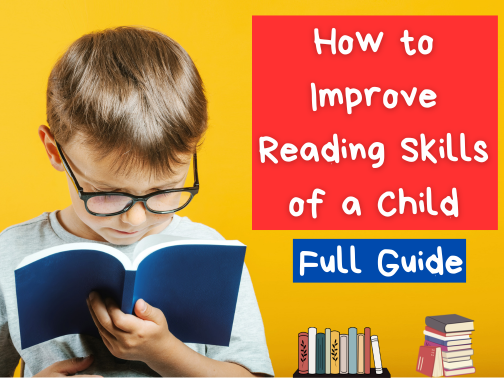Contents
Toggle
Meet David De’ Ath, co-founder, editor, and writer at Wonderful World English. With his extensive background as an English teacher, David provides valuable insights and practical tips on ESL for students and teachers alike.
Reading is crucial to a child’s academic and personal development.
Building strong reading skills at an early age not only aids in language learning but also promotes critical thinking, creativity, and imagination.
Some children can have a more challenging time with reading than others, requiring extra attention to help them improve their reading ability.
Every child has their own set of strengths and areas for improvement, and reading is a skill many students can struggle with.
Fortunately, some great strategies can be implemented to help improve a child’s reading skills. It’s first important to create a reading-friendly environment, and then the child should be encouraged to read more. Several other useful strategies can be put in place to take a child’s reading skills to the next level.
As an experienced teacher, I have taught countless students over the years.
I’ve seen students of all ages and abilities develop, and reading is one of the most fundamental aspects of learning.
By helping children become better readers, we empower them to explore new worlds, gain valuable insights, and help them to express themselves as individuals.
Whether you’re an educator or a parent, this guide will help you explore practical strategies and techniques to improve a child’s reading skills, helping them establish a lifelong love for reading.
Books at the ready, let’s jump in!

How to Improve the Reading Skills of a Child
Reading skills are the foundation of academic success and personal growth.
Children who read well perform better in subjects such as language arts and excel in other disciplines.
Reading broadens their horizons, boosts their vocabulary, and stimulates their imagination.
On top of this, strong reading skills facilitate effective communication and critical thinking, equipping children with essential life skills.
Below are the 12 steps to improve a child’s reading skills:
1. Create a Reading Space
First and foremost, to cultivate a love for reading, creating a nurturing environment at home or in the classroom is crucial.
You can do this by designating a cozy reading corner with a comfortable chair, good lighting, and various age-appropriate books.
Do your best to choose an area with few distractions to help a child focus when reading.
Be sure to make reading materials easily accessible, display books, and set aside dedicated reading time daily.
This will help the child focus and fully engage in the reading material and allow them to see reading as a positive activity.
Find out what keeps the child engaged and stimulated and cater the reading space to this.
For example, if your child loves Spongebob, you could make this the theme.

2. Encourage Regular Reading
Once you have established a reading-friendly environment for your child, it’s time to encourage regular reading habits.
This is key to improving their reading skills.
Set aside specific times for independent reading, preferably when distractions are minimized.
Children should also be allowed to choose books they are interested in that aren’t too difficult for them.
Remember always to celebrate their progress and positively reinforce wanted behavior with rewards and treats to build a sense of accomplishment.
Encouraging healthy reading habits will significantly aid a child in establishing a love for reading.
Rewarding the child for reading is a great way to keep them motivated to learn and develop.
Small gifts such as stickers or candy, or just letting them watch their favorite cartoon can all be great incentives.
The trick here is to establish reading as part of their routine, this will cause them to naturally want to pick up a book and immerse themselves in a new world.
3. Choose the Right Books
Another key step to improving a child’s reading skills is to choose the right books!
This means selecting appropriate reading material to engage children and promote comprehension.
Consider their age, interests, and reading level when choosing what to read.
Introduce a variety of genres and formats, including fiction, non-fiction, graphic novels, and poetry.
This diversity exposes children to different writing styles and subjects, which will, in turn, expand their knowledge and develop their reading skills.
Check out some of the most popular children’s books on Amazon for great examples of material children will love.

4. Interactive Reading Techniques
A great technique to improve a child’s reading is encouraging them to engage with the reading material.
Please encourage them to ask questions, make predictions, and connect stories to their experiences.
It’s a good idea to pause periodically to discuss characters, plot developments, and unfamiliar words.
This will help a child develop critical thinking skills, improve general comprehension, and build a deeper engagement with the material.
Immersing in the material will help a child remain interested and get the most from the reading process.
Teaching reading online can also be a great and convenient way to develop a child’s reading skills if you are not always able to help them face-to-face.
Check out the guide below for insights on how you can do this!
Related Article: How to Teach Reading Online – Teacher’s Guide
5. Phonics and Sight Words
Introducing phonics and sight words is another effective strategy to boost a child’s reading skills.
Focusing on phonics will help children decode words and improve their ability to associate letters with their phonetical sounds.
If the child is a very young learner, you should ensure they understand the alphabet and can sound out each letter.
On the other hand, sight words are frequently used words that children should recognize instantly.
Mastering the foundations of phonics and sight words will bring any child’s reading skills forward by leaps and bounds.
Phonetics is a huge aspect of English proficiency.
Check out the guide below for insights on how to effectively help someone learn phonetics.
Related Article: How to Learn English Phonetics – Full Guide
6. Build Vocabulary
Expanding a child’s vocabulary is another important step to improving their reading skills.
The use of dictionaries and age-appropriate vocabulary-building activities should be encouraged.
New words should be introduced in context, and you can provide definitions that the child can easily understand.
Children should also be encouraged to use these newly learned words in conversations and through writing.
Word games, puzzles, and word association activities can make learning vocabulary more effective and fun.
Check out the guide below for tips on enhancing your or someone else’s vocabulary!
Related Article: How to Teach Vocabulary to ESL Students – Teacher’s Guide

7. Comprehension Strategies
Helping children develop their reading comprehension skills is another huge aspect of improving their reading proficiency.
Some effective strategies include making predictions, summarizing key points, identifying main ideas, and drawing conclusions, to name a few.
Encourage children to visualize the content and ask open-ended questions, promoting critical thinking and deeper understanding.
These strategies will enhance a child’s comprehension and analysis of the reading material.
Writing is another crucial aspect of effective learning.
If you want to know how to sharpen your writing skills, you’re in luck!
Check the guide below to find out more.
Related Article: How to Sharpen Writing Skills – Full Guide
8. Read Aloud
Reading aloud to children can be a great way to enhance the reading experience.
It would help if you encouraged children to read aloud with you and take turns reading a text passage.
Reading enthusiastically and using expressive voices and gestures will help keep a child engaged and entertained while developing their reading skills.
Encourage children to get involved by asking them to read along, repeat words, or predict what will happen next.
This can be a great way to boost confidence and will let you see what words or letters the child is struggling with and allow you to give them more assistance with this.
Doing this will help build a love for reading that a child can keep with them for a lifetime.

9. Use Technology
Technology can be a very useful tool in enhancing a child’s reading ability.
Many great educational apps, e-books, and interactive websites can provide an engaging reading experience.
It’s imperative to note that screen time should be monitored and limited for a child’s health.
Technology should not be used to replace traditional reading methods, only to supplement them.
Striking a balance is essential and can significantly enhance a child’s reading skills if done effectively.
Check out Starfall, Homer, and Bob Books for some great digital material for helping a child read.
10. Track Progress
You should regularly monitor a child’s progress and provide feedback.
This will help guide the child and allow you to see what areas are developing and which require more time and attention.
You can assess a child’s reading skills using appropriate tools, such as reading assignments, quizzes, and discussing the material.
Be sure to identify any areas of improvement and provide targeted support and necessary resources.
Always celebrate milestones and accomplishments to keep the child motivated and inspired to continue to develop their reading skills.
This will help you follow how they are progressing and understand what areas need extra focus.

11. Engage with the Material
To further develop a child’s reading skills, they should be encouraged to engage with literature beyond just reading.
This can be done by writing book reviews, participating in book clubs, or joining reading communities.
Engaging with the literature through discussions and creative writing exercises can also contribute to a child’s social development.
Children are imaginative creatures and love playing, so try to make a game of it.
For some great inspiration for fun classroom games you can play that you could cater to a child who is develing their reading skills, check out the guide below!
Related Article: Fun Classroom Games to Play – Teacher’s Guide
12. Read as a Family
The final step in this guide to help children improve their reading skills is to incorporate reading as a family activity.
You can set aside family reading time, where everyone can choose a book and read together.
This can be a great way to bond with your loved ones and will massively encourage a child to take an interest in reading.
You can discuss books together, share recommendations, and give others insights into the story.
By modeling reading as a habit, adults will inspire children to do the same, which can significantly contribute to developing a love for learning through books.

Conclusion
In conclusion, improving a child’s reading skills is a rewarding journey that requires patience, creativity, and dedication.
There are several key steps that parents or educators can take to help take a child’s reading ability to the next level.
Creating a reading-friendly environment, encouraging reading habits, and employing specific techniques to promote a child’s interest and engagement are important.
Try to establish a love for reading and provide continuous support and guidance.
Together, we can empower children to become lifelong readers, opening doors to knowledge, imagination, and personal development.
We hope this guide has given you an insight into how to improve a child’s reading skills.
Have a wonderful day!
Image Attribution: All images licensed via canva.com






